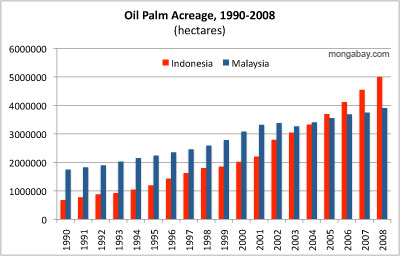A group of prominent scientists has published an open letter challenging the objectivity of World Growth International, an NGO that claims to operate on behalf of the world’s poor, and its leader Alan Oxley, a former trade diplomat who also chairs ITS Global, a marketing firm.
The letter, published online in several forums, slams World Growth and ITS Global as a front groups for forestry companies.
“WGI and ITS — which are frequently involved in promoting industrial logging and oil palm and wood pulp plantations internationally — have at times treaded a thin line between reality and a significant distortion of facts,” the scientists, led by William F. Laurance, a researcher at James Cook University, write.
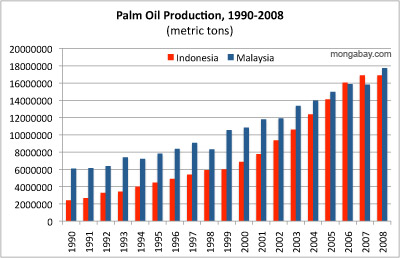
|
The scientists note that while the groups have not disclosed their sources of funding—Oxley told The Star it is ‘immaterial’—they assert ITS receives funding from Sinar Mas, an Indonesian conglomerate that controls Asia Pulp & Paper (APP), a forest products brand, and Sinar Mas Agro Resources & Technology, a palm oil firm, among other companies.
“ITS is closely allied with, and frequently funded by, multinational logging, woodpulp, and oil palm corporations. The financial supporters of ITS include parent corporations producing paper and wood products under the aegis of ‘Asia Pulp & Paper’, among others.”
“WGI frequently lobbies public opinion on the behalf of Sinar Mas holdings, a conglomerate of mostly Indonesian logging, wood-pulp, and oil palm companies that includes Golden Agri Resources, a Singapore-based firm. One of these companies, known as ‘SMART’, could face expulsion by the Roundtable on Sustainable Palm Oil, an industry-led trade group, for ‘serious non-compliance with the RSPO Code of Conduct’ with respect to its environmental and social sustainability guidelines.”
Citing academic research, the scientists call out Oxley and his groups for misrepresenting drivers of deforestation in Indonesia, understating the impact of forest conversion on biodiversity and climate, and ignoring the social costs of large-scale plantation agriculture.
The authors also point to the inherent conflict of interest for Oxley’s groups to serve both as ‘independent’ auditors and PR agents for his clients. They cite a recent ‘audit’ conducted on behalf of Asia Pulp & Paper against charges by Greenpeace that APP’s suppliers were engaged in the clearance of natural forests and peatlands. The audit, which uncovered some errors by Greenpeace but effectively confirmed that APP did engage in conversion of ‘deep’ peat areas, was subsequently ‘spun’ by World Growth to claim that Greenpeace ‘faked’ its report.
The conduct bears striking resemblance to World Growth’s campaign around an audit of SMART’s oil palm plantations by two independent auditors. The audit, released in August, found that SMART had committed environmental transgressions in 8 of the 11 concessions reviewed, but SMART and World Growth subsequently claimed the audit exonerated the firm of wrongdoing. The auditors quickly fired back, issuing a statement that SMART “misreported” the findings.
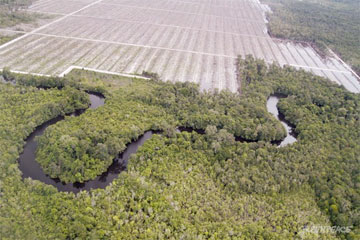 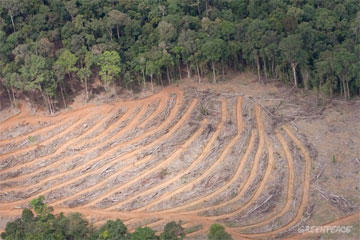 Greenpeace says these are photos proving misconduct by Sinar Mas companies. The top is PT Kartika Prima Cipta’s palm oil concession close to Lake Sentarum National Park, West Kalimantan; the bottom is a PT Bangun Nusa Mandiri concession. Both pictures were taken on July 5, 2010 by Rante (© Rante/Greenpeace). |
“It has come to the attention of BSI Group (BSI) that following the publication of the report ‘BSI-CUC Verifying Greenpeace Claims Case: PT SMART Tbk’ on 10 August 2010, there have been elements of the report that have been misreported as it has been published and presented,” read the statement, which went on to point out specific transgressions by PT Smart.
“There was planting on deep peat (> 3 m) in two estates from 2005 – 2008 which is in breach of the Presidential Decree with regards to deep peat issued in 1990. This also contravened SMART’s own operating instructions,” it said.
“In Central Kalimantan, all concessions examined were found to have carried out land clearance before the environmental impact assessment was approved.”
The scientists conclude their letter by acknowledging the importance of palm oil and other forest projects, but that “a number of the key arguments of WGI, ITS, and Alan Oxley, represent significant distortions, misrepresentations, or misinterpretations of fact.”
“In other cases, the arguments they have presented amount to a ‘muddying of the waters’ which we argue is designed to defend the credibility of the corporations we believe are directly or indirectly supporting them financially,” they write. “As such, WGI and ITS should be treated as lobbying or advocacy groups, not as independent think-tanks, and their arguments weighted accordingly.”
Oxley fired back in a statement sent to the news outlets that carried the letter.
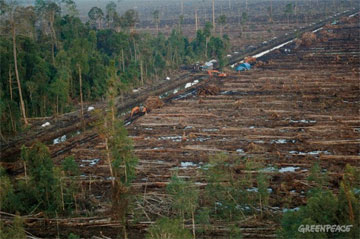 A concession belonging to one of Sinar Mas’ pulpwood companies, PT Bina Duta Laksana. © Greenpeace |
“As a matter of practice we do not disclose our donors like many other NGOs,” he writes, neglecting the fact that both the NGOs he takes to task — WWF and Greenpeace — do disclose their supporters. “Our mission and reason for existence is to alleviate poverty through free trade and economic development and to develop policies to achieve sustainability which do not diminish efforts to reduce poverty or the operation of markets; we are happy to discuss the real issues at stake: more than a billion people who live in poverty.”
Oxley largely stuck to his group’s messaging in his response and did not address the apparent conflicts of interest raised by the scientists or errors in his group’s reports and press statements.
In comments emailed to mongabay.com, APP defended its use of Oxley’s firm. Ian Lifshitz, Sustainability & Public Outreach Manager for APP’s Americas division, writes:
-
“Alan Oxley does have a reputation for positions he has taken and opinions expressed as part of very long and distinguished career in diplomatic and government service as well as work in the private sector. However, his positions have nothing to do with the ITS Global audit itself. This audit was conducted using proven fact-checking methodologies that were peer reviewed and certified. The audit findings show the Greenpeace report cites quotes in documents where the quotes don’t exist. Maps show concessions that don’t exist. Material with high margins of error, as great as 90% according to Indonesian academics, are treated as absolute fact. These issues are clearly outlined in the audit report and show that most of Greenpeace’s claims are misleading, speculative or based on distortions of facts.”
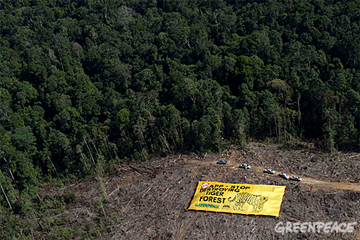 Concession belonging to PT. Tebo Multi Agro (TMA), an affiliate of APP, on the southern part of the Bukit Tigapuluh landscape. Photo courtesy of Greenpeace. |
Mongabay.com’s review of the ITS audit found some questionable claims among the dozens of charges levied by Greenpeace that APP says are false. The audit says that Indonesia is not the world’s third largest greenhouse gas emitter, despite a report from the country’s National Climate Change Council (DNPI) showing that Indonesia trails only China and the United States in emissions. The audit tries to muddy the issue by mentioning per capita greenhouse gas emissions and emissions excluding land use, while citing other irrelevant data on Indonesia’s total forest. The audit suggests that the palm oil and pulp and paper industries are not major drivers of greenhouse gas emissions in Indonesia, while recent research has shown that more than half of oil palm expansion between 1990 and 2005 came at the expense of native forests in Indonesia, and that it, along with logging and timber plantations, are the among the biggest causes of forest conversion in the country.
But Lifshitz stands by the audit and says that Greenpeace is intentionally trying to harm its business. would continue to use groups to defend against “western NGOs… imposing limitations on Indonesia’s sovereign right to develop its economy” as well as ensure the sustainability of its operations.
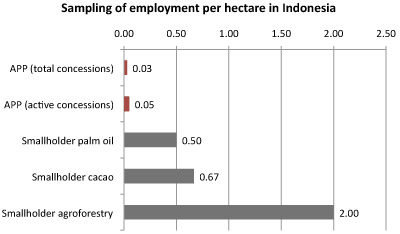 Sample of employment per hectare APP says it employs roughly 80,000 people and holds 2.4 million hectares of concessions, or about one person per 30 hectares of concession (or 1 worker per 18 ha if the area APP has set aside for conservation is excluded), in Indonesia. For comparison, average smallholder holdings for agroforestry in West Java (Ginoga 2004) were 0.5 ha, 2 ha oil palm Indonesia-wide (IPOC 2009), and cacao 0.5 to 1.5 ha (Yasa 2007) (A smallholder is counted as a single person). But the table above only reflects employment, not economic activity (e.g. revenue or wages) or production. For example smallholders account for 44 percent of Indonesia’s old palm concessions, but only 33 percent of national palm oil production. |
“We will use groups like Greenspirit to independently assess our business just as we will use different groups to monitor our continued improvement against our carbon footprint baseline, our certification performance, our social responsibility programs and our chain of custody policies. At the same time we will support groups like the Consumer Alliance for Global Prosperity that respect the right and need for emerging economies to have the opportunity to develop their economies.”
The Consumer Alliance for Global Prosperity (CAGP) is a new group based in Washington D.C. that has launched a campaign against American firms that have adopted sustainability criteria in their sourcing policies. Companies targeted consist mostly of retailers that have dropped APP from their stores, including Office Max, Staples, and Office Depot, but not Walmart, which has cut ties with APP except for its Walmart China division. The Consumer Alliance for Global Prosperity claims that these corporations are colluding with unions and “radical environmental activists” to hurt consumers in the United States.
“The ‘Empires of Collusion’ continue to push an anti-prosperity, anti-trade agenda,” CAGP says in its campaign materials. “This coordinated campaign is run by radical environmentalists and others against the producers of pulp and paper from the developing world, destroying the livelihoods and aspirations of thousands of the world’s poor.”
“This initiative will fight back against anti-trade, anti-prosperity collusion among international Green NGOs, American trade union bosses, and corporations looking to eschew the rigors of a competitive marketplace.”
GACP’s spokesman Andrew Langer has denied links with Asia Pulp & Paper, despite strong evidence of affiliation, including a shared email list and similar language (including typos). Another group, the Initiative for Public Policy Analysis, which is campaigning for the World Bank to weaken social and environmental safeguards when it resumes lending to palm oil companies, also appears to be using the same email list.
These groups will almost certainly face new scrutiny after the open letter. Signatories include William F. Laurance of James Cook University in Australia; Thomas E. Lovejoy of The Heinz Center in Washington, D.C.; Sir Ghillean Prance, Professor and Director Emeritus of the Royal Botanic Gardens, Kew, in the UK; Paul R. Ehrlich of Stanford University; Georgina Mace of Imperial College London; Peter H. Raven, President Emeritus Missouri Botanical Garden in St. Louis, Missouri; Susan M. Cheyne of the University of Oxford; Corey J. A. Bradshaw of The University of Adelaide; Omar R. Masera of the National University of Mexico (UNAM) and Nobel Laureate on behalf of the Intergovernmental Panel on Climate Change; Gabriella Fredriksson of the Golden Ark University of Amsterdam; Barry W. Brook of The University of Adelaide, Australia; and Lian Pin Koh of ETH Zurich (Swiss Federal Institute of Technology) in Zurich, Switzerland.
The scientists say they will issue a rebuttal to Oxley’s response.
An Open Letter about Scientific Credibility and the Conservation of Tropical Forests
Related articles
Misleading claims from a palm oil lobbyist
(10/23/2010) In an editorial published October 9th in the New Straits Times (“Why does World Bank hate palm oil?”), Alan Oxley, a former Australian diplomat who now serves as a lobbyist for logging and plantation companies, makes erroneous claims in his case against the World Bank and the International Finance Corp (IFC) for establishing stronger social and environmental criteria for lending to palm oil companies. It is important to put Mr. Oxley’s editorial in the context of his broader efforts to reduce protections for rural communities and the environment.
Malaysia/Indonesia partnership proposed to counter environmental complaints over palm oil
(10/18/2010) Malaysia and Indonesia should establish “a joint council based in Europe and the United States” to boost the image of palm oil and counter criticism from environmental and human rights groups, a Malaysian minister told Malaysia state press.
The Nestlé example: how responsible companies could end deforestation

(10/06/2010) The NGO, The Forest Trust (TFT), made international headlines this year after food giant Nestlé chose them to monitor their sustainability efforts. Nestlé’s move followed a Greenpeace campaign that blew-up into a blistering free-for-all on social media sites. For months Nestle was dogged online not just for sourcing palm oil connected to deforestation in Southeast Asia—the focus of Greenpeace’s campaign—but for a litany of perceived social and environmental abuses and Nestlé’s reactions, which veered from draconian to clumsy to stonily silent. The announcement on May 17th that Nestlé was bending to demands to rid its products of deforestation quickly quelled the storm. Behind the scenes, Nestlé and TFT had been meeting for a number of weeks before the partnership was made official. But can TFT ensure consumers that Nestlé is truly moving forward on cutting deforestation from all of its products?
Asia Pulp & Paper fumbles response to deforestation allegations by Greenpeace

(09/28/2010) A new audit that seems to exonerate Asia Pulp & Paper from damaging logging practices in Indonesia was in fact conducted by the same people that are running its PR efforts, raising questions about the much maligned company’s commitment to cleaning up its operations. The audit slams Greenpeace, the activist group that accused Asia Pulp & Paper (APP) of illegal and destructive logging in Sumatra in its July 2010 report, How Sinar Mas is Pulping the Planet. It runs through each of the claims laid out in the Greenpeace report, arguing some are speculative or improperly cited. But the audit doesn’t actually deny that APP is clearing forests and peatlands for pulp plantations. In fact, the audit effectively confirms that the company is indeed engaged in conversion of ‘deep’ peat areas, but argues that this activity isn’t illegal under Indonesian law.
Eco-friendly palm oil initiative censures company linked to deforestation
(09/23/2010) The Roundtable On Sustainable Palm Oil (RSPO), a body the sets standards for eco-friendly palm oil production, on Thursday said Indonesian palm oil producer Sinar Mas Agro Resources and Technology (SMART) breached its sustainability criteria and faces expulsion, reports AFP.
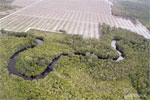
(08/19/2010) Sinar Mas, an Indonesian conglomerate whose holdings include Asia Pulp and Paper, a paper products brand, and PT Smart, a palm oil producer, was sharply rebuked Wednesday over a recent report where it claimed not to have engaged in destruction of forests and peatlands. At least one of its companies, Golden Agri Resources, may now face an investigation for deliberately misleading shareholders in its corporate filings.
APP refutes Greenpeace charges on deforestation, though audit remains absent
(08/12/2010) Asia Pulp & Paper, which has long been a target of green groups for deforestation and threatening imperiled species, is touting a new audit the pulping company says finds allegations made by environmental NGOs, including Greenpeace and WWF, are “baseless, inaccurate, and without validity”. Conducted by the international accounting and auditing firm Mazars, the audit itself has not been released; however Mazars has signed off on the validity of a 24 page document entitled “Getting the Facts Down on Paper”.
Walmart fires back at Greenpeace over deforestation charges

(07/07/2010) Walmart on Wednesday fired back at Greenpeace after the activist group linked the retail giant to destruction of Indonesia’s rainforests through its purchases from Sinar Mas Group’s Asia Pulp & Paper (APP), a Singapore-based firm associated with destructive logging practices. Noting that it was already working with Greenpeace to eliminate deforestation from its supply chain, the world’s largest retailer said it “does not support deforestation” and does not source from APP for its “largest markets.” Walmart said it was “surprised” Greenpeace targeted it in a recent press release announcing a new report.
Nestle’s palm oil debacle highlights current limitations of certification scheme
(03/26/2010) Last week Nestle, the world’s largest food processor, was caught in a firestorm when it attempted to censor a Greenpeace campaign that targeted its use of palm oil sourced from a supplier accused of environmentally-damaging practices. The incident brought the increasingly raucous debate over palm oil into the spotlight and renewed questions over an industry-backed certification scheme that aims to improve the crop’s environmental performance.
Certified palm oil sales accelerate
(02/05/2010) For the first time, sales of certified sustainable palm oil have nearly met production, reports the Roundtable on Sustainable Palm Oil (RSPO), a group that has developed the leading environmental certification standard for palm oil.
Consumers should help pay the bill for ‘greener’ palm oil

(01/12/2010) Palm oil is one of the world’s most traded and versatile agricultural commodities. It can be used as edible vegetable oil, industrial lubricant, raw material in cosmetic and skincare products and feedstock for biofuel production. Growing global demand for palm oil and the ensuing cropland expansion has been blamed for a wide range of environmental ills, including tropical deforestation, peatland degradation, biodiversity loss and CO2 emissions. In response to these concerns, a group of stakeholders—including activists, investors, producers and retailers—formed the Roundtable on Sustainable Palm Oil (RSPO) to develop a certification scheme for palm oil produced through environmentally- and socially-responsible ways. It is widely anticipated that the creation of a premium market for RSPO-certified sustainable palm oil (CSPO) would incentivize palm oil producers to improve their management practices.
Blackwashing by NGOs, greenwashing by corporations, threatens environmental progress
(11/12/2009) Misinformation campaigns by both corporations and environmental groups threaten to undermine efforts to conserve biodiversity and reduce environmental degradation, argues a new paper published in the journal Biotropica. Growing concerns over climate change and unsustainable resource extraction have put companies that exploit the environment in the spotlight. Some firms have responded by taking measures to reduce their environmental impact. Others have alternatively engaged in sophisticated marketing campaigns intended to mislead consumers on their environmental performance, maintaining that environmentally-destructive practices are instead benign. At the same time some activist groups have been guilty of exaggerating claims of environmental misconduct in order to boost support for their campaigns and therefore their fundraising efforts.
Palm oil lobby group launches public relations push to counter environmental complaints
(11/02/2009) A report released by World Growth International in late September claimed that environmentalists are waging a “morally indefensible” campaign against palm oil. The report accurately highlighted the high productivity of oil palm — the world’s highest-yielding commercial oilseed — and noted that the crop has created jobs and driven rural development in Malaysia and Indonesia. Critically, World Growth also downplayed chief concerns about the rapid expansion of oil palm cultivation across southeast Asia, notably worries that palm oil production is contributing to deforestation, putting endangered wildlife like the orangutan at risk, and adversely affecting climate. To make its case, the report made some questionable claims, asserting that oil palm plantations sequester more carbon than natural forests and that deforestation is driven by poverty rather than industrial activities.
in
